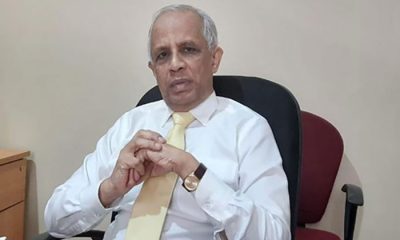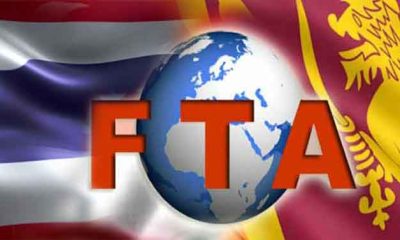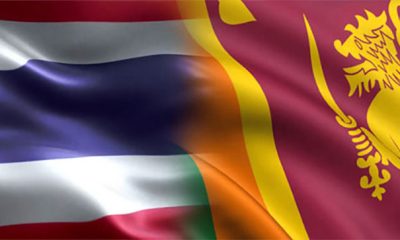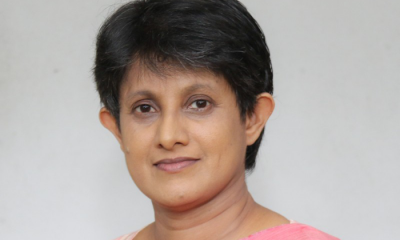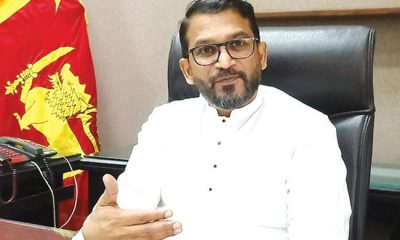News
FTA with Thailand: Need for SL to diversify trade portfolio stressed

By Rathindra Kuruwita
Over 50 percent of Sri Lankan exports to Thailand are gems, and Sri Lanka doesn’t face any trade barriers when exporting precious stones, Subhashini Abeysinghe, says Research Director at Verité Research.
Commenting on the recent free trade agreement between the two nations, she said in a recent television interview that Thailand imported around 300 billion U.S Dollars worth of goods each year, and Sri Lanka’s exports there amounted to about 100 million dollars.
“Thailand is one of the top sources for manufacturing and exporting jewellery. On the other hand, while Sri Lanka has a lot of gems, we are not a country that exports jewellery. We face no trade barrier in exporting gems to Thailand because they are an essential part of manufacturing jewellery,” she said.
Abeysinghe said the purpose of a free trade agreement (FTA) was to remove barriers to trade. She said that 30 percent of the types of goods Thailand already exports were not subjected to any tariffs.
“This means about 3,000 goods Thailand imports are already not taxed. These goods amount to 56 percent of total imports to Thailand. So, we already have duty-free access to over 150 billion dollars in the market, but we export miniscule amounts,” she said.
Abeysinghe said Sri Lanka had not been able to attract FDIs in manufacturing export-oriented products. Sri Lankan policymakers believed that the country would be able to attract such FDIs, if investors saw that Sri Lanka could export goods to many destinations without tariffs.
There was speculation that once the FTA with Thailand was signed, Sri Lanka would be able to attract Thai tourists, especially Buddhist tourists, she said, adding that Sri Lanka had the potential to develop Buddhist tourism.
“However, Thai tourists already have access to on-arrival visa facilities. Given that, I am not sure whether we can attract Thai tourists through an FTA. We can make things easier for tourists by changing the laws and regulations in the country. We don’t need an FTA for that,” she said.
Abeysinghe said Sri Lanka had an FTA with Singapore, a country that already had very low trade barriers. However, Thailand had trade barriers. For example, Sri Lankan garments face a 25 percent tariff when they enter the Thai market, she said.
She said in all trade agreements there was a “negative list,” a list of items that were not subjected to tariffs. Here, both Sri Lanka and Thailand have not relaxed duty on about 15 percent of imports.
“When we look at the FTA with Thailand, both sides have relaxed about 50 percent of the items that are traded. This is also divided into two categories, i.e., goods that are already not subjected to trade barriers and newly relaxed items. As we said earlier, already 30 percent of our exports are not subjected to barriers in Thailand. So, Thailand has only relaxed trade barriers on 20 percent of our exports. On the other hand, only 18 percent of Thai exports are bereft of trade barriers in Sri Lanka now. Here, we must contrast this agreement with the FTAs with India and Pakistan. We speak only about customs duties in the FTAs with India and Pakistan. However, with regard to FTAs with both Singapore and Thailand, we speak about all import duties,” Abysinghe said.
There is a 20 percent customs duty when one imports goods to Sri Lanka. Moreover, there is also a 10 percent Ports and Airports Levy (PAL) and sometimes a 40 percent cess. Thus, the total tax is about 70 percent, she said.
“So, we have agreed to remove all 70 percent, not only customs duties,” she said.
When one looked at the FTA with Thailand, one could say Sri Lanka can export 5,000 items without any barriers, Abeysinghe said, adding that people tended to confuse product coverage and trade coverage.
“There are a lot of items here, but Sri Lanka produced very little. When we look at our export profile, 100 goods account for 80 percent of our exports. We have to see how many of these 100 items have been allowed into Thailand. When we look at the FTA, Thais have lifted barriers only on about 25 percent of those goods,” she said.
Abeysinghe said Thailand produced a large array of goods, and about 49 percent of their trade was covered by the FTA. The problem here was that, compared to Thailand, Sri Lanka did not produce diverse products at a competitive rate, she said.
“This is our Achilles’ heel. I am not sure whether the signing of an FTA will be a solution for this,” he said.
Abeysinghe said Sri Lanka was still heavily dependent on Western markets for its exports and relied on a few items like garments, tea, coconut and rubber.
“The fact that we have not been able to shift to Asian markets and most of our major exports are agricultural goods is a problem. ASEAN countries, on the other hand, are linked to global supply chains. Unlike them, electronics, machinery and components make up less than five percent of our exports. Thais import a lot of such goods. But they hardly import any garments. There is a big mismatch here,” she said.
News
US sports envoys to Lanka to champion youth development

The U.S. Embassy in Colombo welcomed the U.S. Sports Envoys to Sri Lanka, former National Basketball Association (NBA) and Women’s National Basketball Association (WNBA) players Stephen Howard and Astou Ndiaye, from June 8 through 14.
The Public Diplomacy section of the U.S. Embassy said that it would launch a weeklong basketball program intended to harness the unifying power of sports, made possible through collaboration with Foundation of Goodness and IImpact Hoop Lab.
While in Sri Lanka, Howard and Ndiaye, both retired professional basketball players, will conduct a weeklong program, Hoops for Hope: Bridging Borders through Basketball. The Sports Envoys will lead basketball clinics and exhibition matches and engage in leadership sessions in Colombo and Southern Province for youth aged 14-18 from Northern, Uva, Eastern and Western Provinces, offering skills and leadership training both on and off the court. The U.S. Envoys will also share their expertise with the Sri Lanka Basketball Federation, national coaches, and players, furthering the development of basketball in the country. Beyond the clinics, they will collaborate with Sri Lankan schoolchildren to take part in a community service project in the Colombo area.
“We are so proud to welcome Stephen and Astou as our Sports Envoys to Sri Lanka, to build on the strong people-to-people connections between the United States and Sri Lanka,” said U.S. Ambassador Julie Chung. “The lessons that will be shared by our Sports Envoys – communication, teamwork, resilience, inclusion, and conflict resolution – are essential for leadership development, community building, equality, and peace. The U.S. Sports Envoy program is a testament to our belief that sports can be a powerful tool in promoting peace and unity.”
News
Rahuman questions sudden cancellation of leave of CEB employees

SJB Colombo District MP Mujibur Rahuman in parliament demanded to know from the government the reasons for CEB suspending the leave of all its employees until further notice from Thursday.
MP Rahuman said that the CEB has got an acting General Manager anew and the latter yesterday morning issued a circular suspending leave of all CEB employees with immediate effect until further notice.
“We demand that Minister Kanchana Wijesekera should explain this to the House. This circular was issued while this debate on the new Electricity Amendment Bill was pending. There are many who oppose this Bill. The Minister must tell parliament the reason for the urge to cancel the leave of CEB employees,” the MP said.However, Speaker Mahinda Yapa Abeywardena prevented Minister Wijesekera responding to the query and said that the matter raised by MP Rahuman was not relevant.
News
CIPM successfully concludes 8th Annual Symposium

The Chartered Institute of Personnel Management (CIPM) successfully concluded the 8th Annual CIPM Symposium, which took place on 31st May 2024. Themed “Nurturing the Human Element—Redefining HRM in a Rapidly Changing World,” the symposium underscored the pivotal role of human resource management (HRM) in today’s dynamic global landscape. Since its inception in 1959, CIPM has been dedicated to advancing the HR profession through education, professional development, and advocacy, solidifying its position as Sri Lanka’s leading professional body for HRM.
Ken Vijayakumar, the President of the CIPM, graced the occasion as the chief guest. The symposium commenced with the welcome address by the Chairperson, Prof. Arosha Adikaram, followed by the Web Launch of the Symposium Proceedings and Abstract Book by the CIPM President. The event featured distinguished addresses, including a speech by Chief Guest Ken Vijayakumar, President of CIPM, and an address by Guest of Honor Shakthi Ranatunga, Chief Operating Officer of MAS Holdings Pvt. Ltd., Sri Lanka.
The symposium also featured an inspiring keynote address by Prof. Mario Fernando, Professor of Management and Director of the Centre for Cross Cultural Management (CCCM) at the University of Wollongong, Australia.
Vote of Thanks of the inauguration session was delivered by Dr. Dillanjani Weeratunga, Symposium Co-chair.
The symposium served as a comprehensive platform for researchers to present their findings across a wide range of critical topics in HRM. These included Cultural Diversity and Inclusion, Talent Development and Retention, Ethical Leadership and Corporate Social Responsibility, Adapting to Technological Advancements, Mental Health and Well-being at Work, Global Workforce Challenges, Employee Empowerment, and Reskilling and Upskilling.
The plenary session was led by Prof. Wasantha Rajapakse. Certificates were awarded to the best paper presenters during the valedictory session, followed by a vote of thanks delivered by Kamani Perera, Manager of Research and Development.
The annual symposium of CIPM was a truly inclusive event, attracting a diverse audience that spanned undergraduates, graduates, working professionals, research scholars and lecturers. This widespread interest highlights the symposium’s significance in the field of HRM, offering a unique opportunity for everyone to network and learn from scholarly brains.The CIPM International Research Symposium was sponsored by Hambantota International Port, Sri Lanka Institute of Information Technology (SLIIT), E B Creasy & Co. PLC, and Print Xcel Company.


